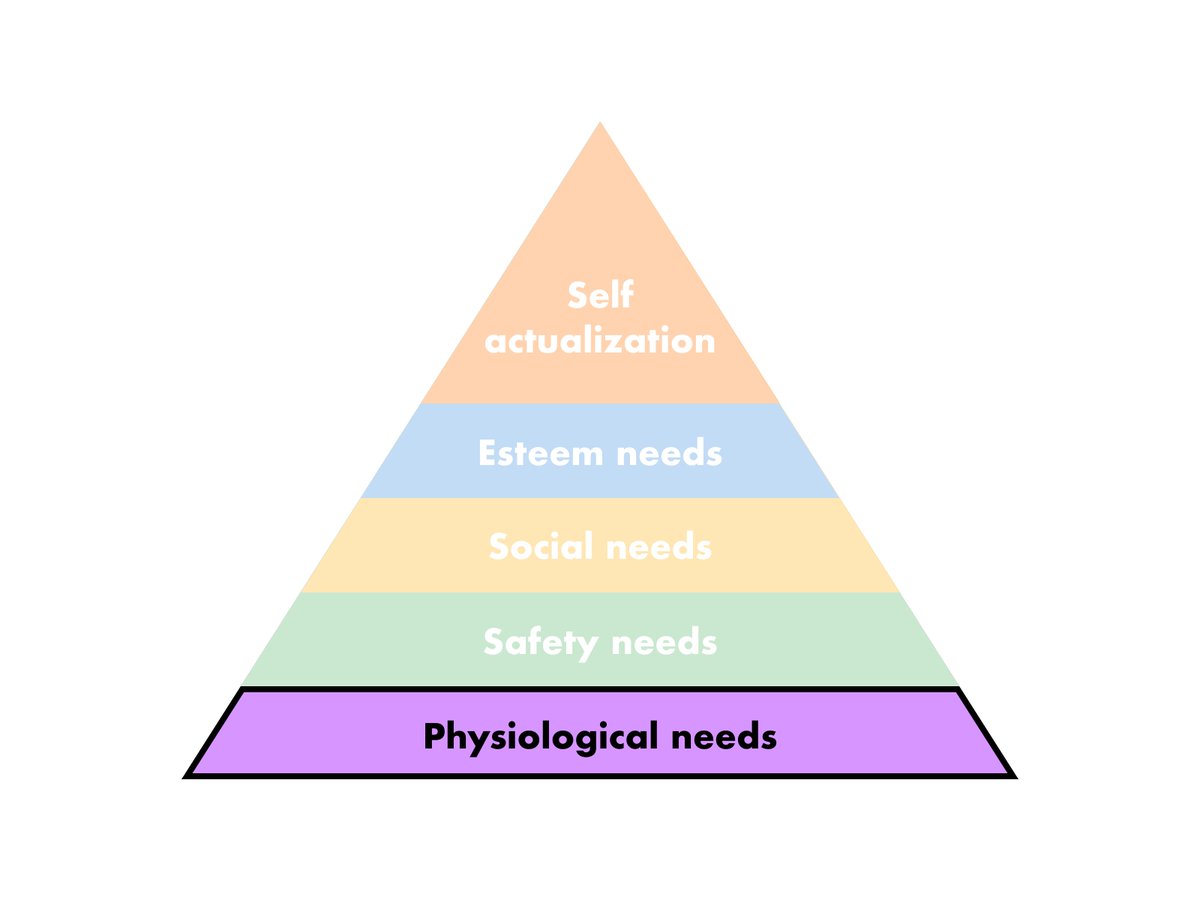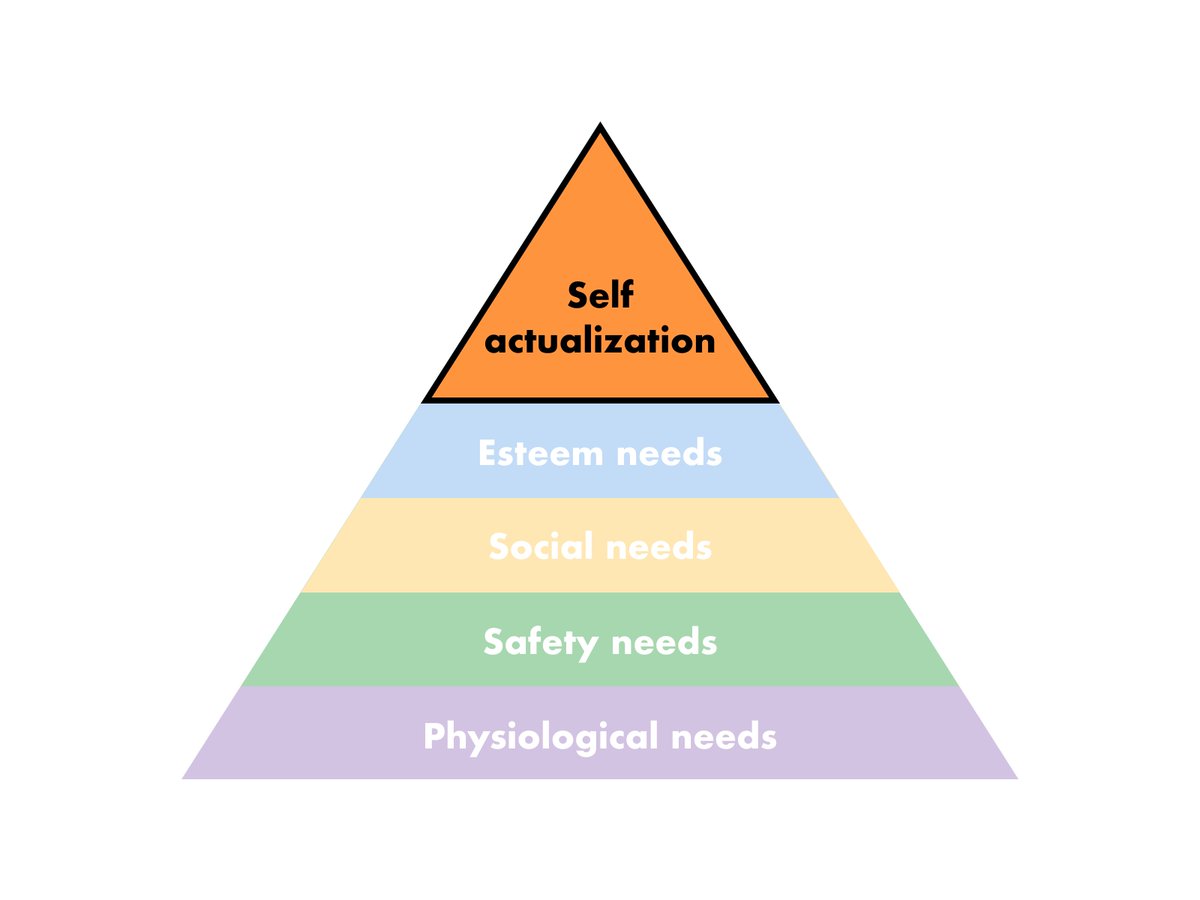There’s been chatter about when to start reopening things so people can go back to their “normal” lives.
Sorry to say this: there is no snapping back to 2019 trends. Mass human psychology has DRASTICALLY changed at every level of the Maslow’s Hierarchy of Needs.
(THREAD)
Sorry to say this: there is no snapping back to 2019 trends. Mass human psychology has DRASTICALLY changed at every level of the Maslow’s Hierarchy of Needs.
(THREAD)
1/ Let’s first talk about basic physiological needs. These days, it’s all about “essentials”. People buy their essentials at grocery stores or from Amazon and try to figure out what is essential anyway. The things they buy? The things they do? Their job?
2/ There’s something else that has become a real essential: the digital world. Imagine this crisis without Internet access! Back in 1918, people who were isolated due to the Spanish flu only had a book or two to keep them entertained.
3/ This trend of focusing on essentials will continue to drive the market after the reboot. In the spirit of food network host Alton Brown, there is no place for fancy “unitaskers” with a single purpose. Flexible products that solve common problems will be much more popular.
4/ Habits are changing too. They used to be all about immediate gratification. Now, people are forced to learn how to wait—until quarantine is over, until schools reopen, until toilet paper is back in stock, until the stimulus check arrives.
5/ This willingness to wait will impact the speed of economic recovery and change the efficacy of advertising. It will shape the products and services that dominate the next era. There is no place for short-term-oriented products.
6/ Let’s talk about safety needs. I think we’re witnessing the end of the sharing economy. That economy, as we know it, simultaneously exposes buyers to physical risks and sellers to economic risks. Because customers are afraid to get sick, gig workers and hosts are going broke.
7/ Take WeWork. Their business model will be problematic even after the virus subsides. The thought of being crammed into small glass boxes feels fundamentally unsafe now. They will be hard-pressed to find customers who want to return to that level of physical proximity.
8/ Take Airbnb. Hosts are losing their minds over the evaporation of bookings, which they considered a reliable source of income. The prospect of an empty apartment they need to pay a mortgage for, without revenue, is too much economic insecurity for them. Thus, they exit.
9/ The tech industry darlings of the 2010s have to satisfy both sides of the market, which has become impossible. Airbnb can’t please the travellers who ask for refunds plus the hosts who need the deposits. For the platform, there is no win. And everybody ends up blaming them.
10/ After this crisis, people’s expectations of tech platforms will be different. Instead of one global marketplace controlled by one website, we will see more diverse offerings connected by software. But the software is not your boss—it’s just a tool you use for coordination.
11/ Let’s talk about our need to be social again. The shutdown is shifting our sense of belongingness and group identity—from physically defined spaces to digitally defined spaces.
12/ Outside of social media, the social structures in people’s lives are typically defined by physical spaces. A zip code implies what they stand for + who they are. Someone who lives in Beverly Hills has a totally different social structure than someone who lives in Bushwick.
13/ So much of where people choose to live is about choosing the group to which they belong.
This begs the question: When people leave their chosen identity cluster and go back to their hometown for several months, will their perceived identity change?
This begs the question: When people leave their chosen identity cluster and go back to their hometown for several months, will their perceived identity change?
14/ Furthermore, if culture and identity are defined by street scenes that are in turn shaped by small businesses, many of which are forced to close their doors during this crisis, is there even anything left for the residents to return to afterwards?
15/ Even students are losing their sense of identity. Having left campus, they realize how different online instruction is. But why is that? Is it because most of what defines a course is the setting, the affiliation, and the incidental interaction between people?
16/ Similarly, people who belong to organized religions can’t worship together anymore. This means that even collective identity defined by religion is facing a challenging period ahead.
17/ And what about work? Many companies have shifted the in-office experience to a work-from-home situation. Will people’s social needs be sufficiently fulfilled in physical isolation? Will their interactions with co-workers be adequately replaced with remote-work technologies?
18/ What if new types of clusters form? Clusters that are not defined by physical space and distance—but by virtual places instead?
19/ Let’s talk about esteem needs. Everybody has to try to come out of this crisis stronger than before. We now have a lot of free time. Plus economic pressure. Plus the human desire to achieve something. Self-esteem is no longer defined by consumption, but by creation!
20/ This is the time to learn the skill sets of developers or other makers. While they are hard to learn, they are rewarding. These days, when someone asks if you know how to code, you want to say “yes”, which just seems so much better than “I went to an Ivy League university.”
21/ Take the field of education. The real revolution in that field may not be about universities and grade schools going online—but about the recognition that the most engaging on-screen teachers are actually YouTube stars! Students making videos. Amateurs teaching amateurs.
22/ YouTube stars are both makers and teachers. It is likely that those people will not only be Internet-famous; they will become real stars and leaders, movers and shakers, unencumbered by physical space and restrictions of existing institutions.
23/ The next era won’t be about what you buy, what you wear, or what you have. Someone with great esteem will be someone who is able to make, create, and teach—whether it is based on open-source software, 3D design, or other types of media.
24/ Let’s talk about self-actualization. Because the real world is in peril. The governments, laws, and regulations are stretched to their limits. So, what do we do? How do we achieve our full potential?
25/ The politicians and civil servants can shut down the physical world. They can redirect financial resources. But ultimately, they will have to come to the recognition that the digital world is where it is going to be played out.
26/ Doing things online is now the default way. The growth of online versus in-person will not drop back to the trend line of gradual growth after the crisis is over. By then, e-commerce will be commerce. E-learning will be learning. Online communities will be communities.
27/ Yet, online spaces are not nearly good enough to replace the real world. The Zoom backlash has begun. And people will start complaining about other tools they use in isolation too. These software channels can’t fill the holes created by the sudden needs of isolated people.
28/ But clearly, the demand for software is there and is huge. Which means that the online world WILL be 10 times better in a year and 100 times better in two years. That is just Moore’s law and software eating the world.
29/ Note: Those who build platforms that facilitate online and offline interactions are not the urban planners of the next phase; they are more like hardware store owners, who sell people the tools they need, so they can build the space they see and feel when they come back.
30/ Therefore, those who understand technology, design, psychology, politics or ethics, need to come together to create a new toolbox. We need to let real people learn those tools, so they can reconstruct their space—both physical & online, personal & shared, private & public.
31/ People want to connect. They want to organize, they want to achieve, and ultimately, they want to self-actualize. The way they spend their money, their time, and their energy to learn—that is the real force that will shape the new society we will see emerge after the reboot.
32/ We need platforms that can evolve to fit human needs. A product that emerges from people’s collective creativity. And economic benefits for all contributors. That is our challenge as a society faced with this sudden juxtaposition of the physical world & the online world.
33/ I believe that we will move from a consumptive world to a constructive world. The late majority that are joining the digital world now, doing their first Zoom, joining their first Slack, are not going to stop after the shutdown is over. They are hooked.
34/ After the global COVID shutdown, we are going to need a full reboot of the machine we call human society. Heck, since this biological virus has caused such havoc, let’s take the opportunity to do a clean install of a new operating system for this digital-first decade.
PS/ If you found this thread interesting, you might like the Medium post that expands on these thoughts: https://medium.com/cardstack/rebooting-the-world-after-the-covid-19-shutdown-3c53c989e499">https://medium.com/cardstack...

 Read on Twitter
Read on Twitter






